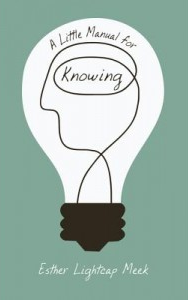 A review of A Little Manual for Knowing by Esther Lightcap Meeks. Published by Cascade Books.
A review of A Little Manual for Knowing by Esther Lightcap Meeks. Published by Cascade Books.
It turns out that knowing things is pretty important.
It’s so important that when you try and talk about knowing, it sort of slides off the brain. This is basic self-preservation: if we stopped to think about knowing every time we were involved in knowing, our normal activity would very quickly grind to a halt. It’s like trying to think about how you breathe.
Yet, the importance of knowing is underscored in almost every debate, whether large-scale—climate change or creationism—or small-scale—whose turn is it to take out the bin? All of these, in their own ways, resolve around knowing: Where are you getting your information from? Why is your knowledge more valuable than mine? In short: how do you know?
The fancy word for this is epistemology, the study of knowing, and epistemology is something that author Esther Lightcap Meek writes about as Professor of Philosophy at Geneva College in the US. And so, in the charmingly named A Little Manual for Knowing, she offers an introduction to epistemology. It’s a book that condenses two earlier, longer works of hers, in a sort of layperson’s introduction to her thought.
The heart of the book is wrapped around an understanding of knowing based largely on the work of philosopher Michael Polanyi. It’s essentially an argument against knowing as “knowledge conquest”—think about the relationship of student to textbook, which, in its most ideal sense, is student reads textbook, student learns textbook. Now, think about how much you actually remember, and how much you know, of any textbook you’ve read …
Here’s how Meek puts it: knowledge-as-information “tends to reduce reality to two-dimensional ones and zeros, impersonal bits, so much data to be collected.”
Instead, Meek argues that “[reality] is not impersonal; rather, reality is person-like … It is richly multi-faceted, deeply dynamic, ever new and surprising, never to be sapped of mystery.”
Hopefully, that sounds familiar. It’s an attempt at using a Christian lens to view reality. Rather than an empty plane of existence where we are in the centre and exist to consume what knowledge that might lie out there, Meek’s argues for a view of epistemology that implicitly places God at the centre, as revealer of knowledge, and giver of reality.
Meek is a little coy about the Christian emphasis within the book—it’s intended for non-Christians and Christians alike—but there is an obvious hope that within Meek’s frame of reference, the necessity of God for a right view of knowledge and reality will be apparent.
Essentially, it’s an argument for knowing as holistic, rather than simplistic, and so Meek circumscribes a right stance to knowing—see sample chapter titles “Love”, “Invitation”—and a method of understanding how people know—see sample chapter titles “Encounter”, “Shalom”.
It’s a provocative argument, and the chapters are invitingly short. And, at its best, it did what great thought does—after you’ve read it, you’re startled into a different way of seeing the world. And not only seeing, but of understanding how you teach, how you preach, how you write, and how you learn.
Are there drawbacks of A Little Manual for Knowing? Certainly. It suffers from the usual dislocation of a top-shelf academic trying to write a book at a popular level: sometimes the writing is awkwardly worded, and the sparse illustrations are less than current (for example, references to Star Trek … the original series). In this, it’s a common trap for academic writers, who think that writing at a popular level is a matter of simplifying, rather than translating to a different kind of writing.
And I have to admit, that as much as it was provocative to my knowing, the casual reader may find it on the esoteric side, if they are not up to the challenge.
But if you are up for it, or if you have a friend or family member about to embark on a “knowing venture” like Bible college or university, this book could truly change how you know.
Guan is the reviews editor at Eternity. Any comments or suggestions for books to review, feel free to get in contact at @thisisguan.
Email This Story
Why not send this to a friend?
